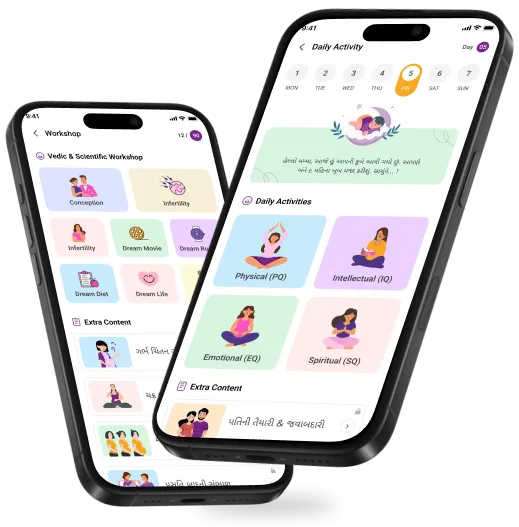Hey there, beautiful moms and mom-to-be!
Today, let’s explore the wonderful world of pregnancy. And let me tell you, it is filled with unexpected twists, turns, and a whole lot of love.
Welcome to pregnancy! You're craving sweets, but are they okay for your baby? Let's find out together. We'll talk about how much sugar is safe during pregnancy. Join us on this journey to keep you and your baby healthy while satisfying those sweet cravings.
Imagine this: You wake up one morning, eagerly awaiting the moment of truth. Your period is late, and you're feeling those hopeful butterflies in your stomach. You rush to the bathroom, grab a pregnancy test kit, and take the pregnancy test at home. But what if the result isn't what you expected? What if it's wrong? A faint line? Pregnancy test kit positive? Negative pregnancy test kit? What does it mean?
You see, pregnancy tests are usually reliable, but they're not always 100% accurate. There are few reasons why you might get a wrong result, and it's essential to know about them, especially when you're trying to conceive.

First things first, let's talk about how a pregnancy test works. These kits detect a hormone called Human Chorionic Gonadotropin (HCG), which is produced by the placenta shortly after a fertilized egg attaches to the uterine lining. When you pee on the stick, it reacts with this hormone, giving you a positive or negative result. I got a very faint line on a pregnancy test? A very very faint line on a pregnancy test almost invisible, a lot of you have such questions?
A faint line on a pregnancy test can mean a few things. It could be a real positive pregnancy test kit result, indicating that HCG is present in your urine but in low levels. It could also be an evaporation line, a false positive caused by urine drying on the test strip. Or, it could simply be a faulty test.

Well, let's talk about that. Here are five reasons why your pregnancy test might give you the wrong result:
1. Recent miscarriage:
Sadly, miscarriages can imbalance your hormone levels, leading to false positives on pregnancy tests. It takes time for your body to recover, so if you've recently experienced a miscarriage, be cautious about relying on test results too soon. If you've recently had a miscarriage, your body might still have higher levels of pregnancy hormones. This could lead to a false positive result on a pregnancy test.
It's heartbreaking, but it's essential to give your body time to heal before relying on a test again. Miscarriage is very painful and it can take time for your body to get back to pre-pregnancy hormone levels. During this time, women may worry about seeing a false positive sign on a pregnancy test.
Similarly, women who undergo abortions may experience false test kit results up to six weeks after the procedure.
2. Ectopic pregnancy:
Picture this: Instead of the fertilized egg implanting in the uterus where it belongs, it decides to set up in the fallopian tube or somewhere else it shouldn't be. This is called an ectopic pregnancy, and it can mess with your hormone levels, giving you false results on a pregnancy test.
Sometimes, instead of implanting in the uterus where it's supposed to, the fertilized egg implants somewhere else, like the fallopian tube. If you see any signs of ectopic pregnancy, immediately go to the doctor and get tested as soon as possible.
{{cool-component}}
3. Fertility drugs:
Imagine taking medication to help you get pregnant, only to find out it's affecting your test results. That's what can happen with fertility-enhancing drugs. They can throw off your hormone levels, leading to false positives or negatives.
These medications can mess with your hormone levels, making it tricky to interpret the results of a pregnancy test. Women who are taking medications to enhance fertility are often given hormone-releasing drugs, which can affect egg supply, causing pregnancy tests to give false results.
Some other medicines like anti-psychotic and anti-anxiety medicines can also sometimes show wrong results.
4. Testing too soon:

Missing your period is usually the first indication to take a pregnancy test. The cells of the uterus surrounding the growing embryo, which are responsible for the formation of the umbilical cord, release Human Chorionic Gonadotropin (HCG) hormone into the blood, which, if found in urine or blood, confirms pregnancy.
For a woman, it is advisable to first read the instructions of how to use a pregnancy test kit and follow the guidelines on pregnancy test kit use to see the accurate results.
How soon will a pregnancy test read positive? You're eager to know if you're pregnant, so you take a test the moment your period is late. But hold on a sec! It takes time for your body to produce enough of the pregnancy hormone (HCG) for a urine pregnancy test to detect.
When to do a pregnancy test? Wait at least 8 to 10 days after your missed period for more accurate pregnancy test kit results. Patience is key when it comes to taking a pregnancy test. It takes time for your body to produce enough of the pregnancy hormone (HCG) for a test to detect. If you test too early, you might get a false or real negative pregnancy test result, even if you're pregnant.
5. Health conditions:
Sometimes a serious infection or health condition can interfere with your hormonal activities and you may get false results while taking a pregnancy test. However, it does not have concrete results. Some of the most common conditions that can become problematic while conceiving include ovarian cysts, kidney infections and UTIs (Urinary Tract Infections). Thyroid and hormonal imbalances can also make you susceptible to false results.
Your body's hormonal balance can be affected by various health conditions, such as ovarian cysts, kidney infections, or thyroid imbalances. These conditions can interfere with the accuracy of a pregnancy test, giving you false results.
{{cool-component-1}}
Conclusion
So, what should you do if you suspect a wrong pregnancy test result? First off, don't panic. Consider taking another test a few days later or, better yet, consult a doctor for a blood test, which is more accurate. They can provide guidance and support, ensuring you get the most reliable results. And remember, it's always a good idea to have a healthcare professional guide you through this journey.
In conclusion, while pregnancy tests kits can be a handy tool, they're not foolproof. Keep in mind these factors that can affect your results, and always seek medical advice if you're unsure. After all, when it comes to something as life-changing as pregnancy, it's better to be safe than sorry.
So, whether you're eagerly awaiting that positive result or hoping for a negative, just remember to take a deep breath and trust the process.
Stay positive, stay patient, and most importantly, stay informed. Your journey to parenthood is just beginning, and with the right tools and knowledge, you're ready to tackle whatever comes your way. Happy testing!
Disclaimer: This blog is correct as per the writer's knowledge. This is not medical guidance. Follow as you are responsible for.












.webp)

.webp)





